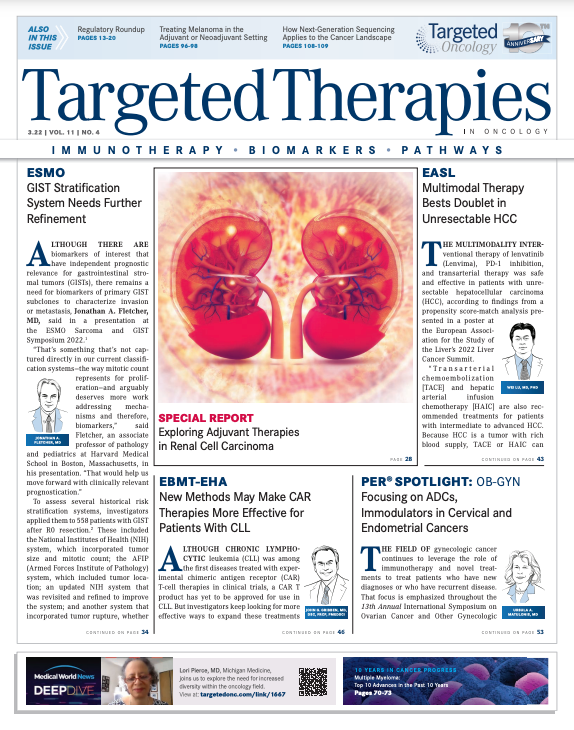GIST Stratification System Needs Further Refinement
There remains a need for biomarkers of primary gastrointestinal stromal tumor subclones to characterize invasion or metastasis, according to Jonathan A. Fletcher, MD.
Jonathan A. Fletcher, MD

Although there are biomarkers of interest that have independent prognostic relevance for gastrointestinal stromal tumors (GISTs), there remains a need for biomarkers of primary GIST subclones to characterize invasion or metastasis, Jonathan A. Fletcher, MD, said in a presentation at the ESMO Sarcoma and GIST Symposium 2022.1
That’s something that’s not captured directly in our current classification systems—the way mitotic count represents for proliferation—and arguably deserves more work addressing mechanisms and therefore, biomarkers,” said Fletcher, an associate professor of pathology and pediatrics at Harvard Medical School in Boston, Massachusetts, in his presentation. “That would help us move forward with clinically relevant prognostication.”
To assess several historical risk stratification systems, investigators applied them to 558 patients with GIST after R0 resection.2 These included the National Institutes of Health (NIH) system, which incorporated tumor size and mitotic count; the AFIP (Armed Forces Institute of Pathology) system, which included tumor location; an updated NIH system that was revisited and refi ned to improve the system; and another system that incorporated tumor rupture, whether interoperative or preoperative, as a clear, poor prognostic factor, Fletcher said. Investigators determined all these systems were able to distinguish between low-risk and high-risk GIST.
“There were negligible differences between very low-risk vs the low-risk categories in outcome for the systems that had those,” Fletcher said. “A number of the systems had already collapsed into 1 low-risk category, recognizing the findings that Schmieder et al2 confirmed, in the case that both of these groups do very well. And there were negligible differences between the 5 systems in predicting outcome.”
KIT WK deletions have also been linked to poor prognosis.3-4 This can also be referred to as 557 and/or 558 deletions. These deletions have been shown to be a time-dependent prognostic variable. Patients with 557 and/or 558 deletions had poorer relapse-free survival in the first 4 years after resection. In another study, patients with these deletions had poorer relapse-free survival 1 year after starting treatment with adjuvant imatinib (Gleevec) but not at 3 years. “Studies on the relevance of WK continue to move studies forward and has not been incorporated in any of the standard risk classifi cations that are widely used, but there’s continued debate as to whether that should be the case,” Fletcher said.
Another study demonstrated the prognostic importance of WK deletion in 96 patients.5 Fifty percent of patients with the WK deletion relapsed after 7 years of follow-up, 26% relapsed if there was no deletion in 557/558 codons, and 111% relapsed if they had some other form of PDGFRA mutation. In addition, this study found that patients with intermediate-risk GISTs with 557/558 deletions had the same recurrence-free survival risk as patients with high-risk GISTs without KIT deletion. “In other words, that might be, as people have posited, one of the factors for intermediate risk GIST that would lead you to consider treating a bit more aggressively,” Fletcher said.
Protein Biomarkers
There have been several other protein biomarkers for GIST prognosis, some of which can be split into 2 categories. The first category focuses on whether applying prognostic factors in other cancers, such as gastrointestinal carcinomas, can also indicate prognostic-important GIST, which has often been possible. Whether these protein biomarkers have independent prognostic significance above and beyond what is obtained from standard-risk classifi cation systems remains to be determined. The other group has both poor prognostic importance but also ties into known aspects of GI biology, Fletcher explained. “That’s reassuring that there’s a particular relevance in GIST, but on the other hand, we have the feeling they’re already represented by aspects of standard risk classifi cation,” he said.
One example is overexpression of aurora kinase-A, which confers poor prognosis, although this mitotic entry protein is represented in the standard-risk classification systems by mitotic index and tumor size. Questions remain regarding its true independent relevance, Fletcher said. Questions also persist related to MCM6 overexpression for prognosis in GIST. Overexpression of this DNA replication initiation marker is significantly associated with higher mitotic counts and tumor size.
Because GIST is a unique tumor, genomic progression also plays a role, and that information may be used to improve prognosticators. Fletcher noted there are at least 3 events that occur at different points in progression that collectively and incrementally dysregulate the cell cycle: the initiation of KIT/PDGFRA/NF1 mutation, which fosters proliferation; 14q deletion, which targets the MAX tumor suppressor gene; and RB1 inactivation. These are early events, so they are not necessarily candidates for prognosticators, Fletcher said.
Another event that may follow MAX inactivation is activation in the chromosome 22 long arm of DEPDC5, which is an inhibitor of mTOR. This is also an early event, so it may not be considered a potential prognosticator. Fletcher noted it’s the third event that regulates the cell cycle. Although these are biomarkers of poor prognosis, “do they really give us anything that the mitotic count isn’t already delivering,” Fletcher said.
The end of the chain of progression events characterized in primary GIST is the inactivation of the DMD gene, which codes for the protein dystrophin. This protein is known to regulate between the cytoskeleton and the extracellular matrix to foster invasiveness, migration, and inactivation of the gene. Dystrophin is expressed in interstitial cells of Cajal and low-risk GISTs. In addition, it is inactivated in approximately 90% of metastatic GISTs.
“This is [also] occurring in primary GIST. It’s creating a clone that’s permissive for invasiveness and metastasis,” he said. “I would argue it’s not captured by the current risk classifi cation system. It’s the kind of marker we should be developing in parallel with standard risk classification. Unfortunately, it’s proven to be diffi cult to demonstrate these losses routinely at the RNA or protein levels—a simple assay, [such as] immunohistochemistry, for instance. That’s holding the fi eld back.”
REFERENCES:
1. Fletcher JA. Pathology and molecular assessment of GIST: implications for risk stratifi cation. Presented at: ESMO Sarcoma and GIST Symposium 2022; January 31-February 2, 2022; Virtual. Accessed February 1, 2022; https://bit.ly/3GxHGGP
2. Schmieder M, Henne-Bruns D, Mayer B, et al. Comparison of different risk classifi cation systems in 558 patients with gastrointestinal stromal tumors after R0-resection. Front Pharmacol. 2016;7:504. doi:10.3389/fphar.2016.00504
3. Martin-Broto J, Gutierrez A, Garcia-Del-Muro X, et al. Prognostic time dependence of deletions aff ecting codons 557 and/or 558 of KIT gene for relapse-free survival (RFS) in localized GIST: a Spanish Group for Sarcoma Research (GEIS) Study. Ann Oncol. 2010;21(7):1552- 1557. doi:10.1093/annonc/mdq047
4. Joensuu H, Wardelmann E, Sihto H, et al. Eff ect of KIT and PDGFRA mutations on survival in patients with gastrointestinal stromal tumors treated with adjuvant imatinib: an exploratory analysis of a randomized clinical trial. JAMA Oncol. 2017;3(5):602-609. doi:10.1001/jamaoncol.2016.5751
5. Incorvaia L, Badalamenti G, Fanale D, et al. Not all KIT 557/558 codons mutations have the same prognostic infl uence on recurrence-free survival: breaking the exon 11 mutations in gastrointestinal stromal tumors (GISTs). Ther Adv Med Oncol. 2021;13:17588359211049779. © drimafi lm / stock.adobe.com doi:10.1177/17588359211049779
